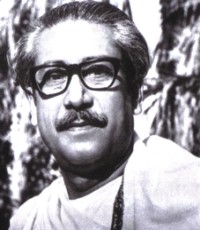| Tribute
Bangabandhu 1920-1975
Architect Prof. Dr. Nizamuddin Ahmed
(A tribute on the 90th birthday 17 March to the Father of the Nation)
The spark of the radiance was lit at the early age of eighteen when he was imprisoned for demanding self-rule for Bangali at a political gathering. A patriot had emerged from within the people.
His fiery brand of leadership got him elected General Secretary of the Calcutta Islamia College Central Students Union. At twenty-six, his charisma had already made an international impact.
Within three months of the creation of Pakistan a bizarre political entity for many reasons he had defined the eastern part as 'Bangladesh' at a 1947 conference of the East Pakistan Muslim Students League at Narayanganj. A leader of the land was born.
He was arrested in 1949, 1952, 1954, 1958, 1966, and 1971 for upholding the rights of the people. His voice was not to be shackled by the chains of any prison. He was a man of tremendous courage.
At thirty-three, he became the General Secretary of Awami Muslim League. A year later he was inducted as the youngest minister in the cabinet of Chief Minister Sher-e-Bangla A K Fazlul Haque. A policy-maker was discovered.
He was instrumental in inducting religious neutrality in his party; Awami Muslim League became Awami League in 1955. A devout Muslim, he embraced all and sundry in the true spirit of Islam. He was the beloved son of the soil.
The decision got the people's mandate, as a year later he was elected member of the Constituent Assembly of Pakistan. A parliamentarian was in the making.
He knew his priority. In an illustration rare in our political affairs, he resigned 1957 as minister for trade, industry, and anti-corruption to commit himself to the party's organizational work, which at the time was synonymous to exerting for Bangali’s self emancipation. That visionary instance has remained unmatched till today.
Soon afterwards he bestowed the nation with the six-point demand, which led to our independence. He was a thinker on behalf of his people.
In 1968 the Pakistan government put him on trial while in custody on charges of high treason, of conspiring with senior army and civil officials to overthrow the government in what became the legendary Agartala Conspiracy Case. It was now the people's turn to repay their debt, and a mass movement within a year toppled Pakistani General Ayub Khan, compelled the government to withdraw the case, release of Sheikh Mujib and other co-accused. The people named him the friend of Bengal.
He expressed his gratefulness almost immediately to the downtrodden Bangali by declaring that independent East Pakistan would be known as Bangladesh. He could read the sentiment of the mass.
His labour for people's liberty and justice was overwhelmingly endorsed by the electorate when in the 1970 Pakistan general elections his Awami League won 167 seats of the 169 in East Pakistan. A statesman rose from among the rank and file.
His 7 March 1971 speech at the then Ramna Race Course (presently Suhrawardhy Udyan) --'the struggle this time is for freedom... the movement this time is for independence'-- remains the most decisive, definitive, and dramatic in the history of mankind. The outstanding and extraordinary address was an undisputed leader's explicit direction to a nation seeking independence from a tyrannical regime that was Pakistan. It shall remain in the annals as the most remarkable political speech ever. He was an orator par excellence.
On the night of 25 March 1971 the then vicious Pakistan Army launched Operation Searchlight, commencing the most gruesome murder of innocent civilians in their thousands. In the wee hours of 26 March 1971 in a display of exceptional wisdom he declared the independence of Bangladesh, concluding with the words 'may Allah be with you'. He was a politician of exceptional sagacity.
Although he was arrested immediately after, and confined to an unspecified Pakistan jail, the provisional Mujibnagar government in Meherpur elected him the first president of Bangladesh. He was dearly respected by his colleagues.
He was released from Pakistani military custody after final victory was attained against the occupying forces. He returned as a philosopher, friend, and a guide to the independent and liberated Bangladesh.
In a cowardly act by some debauched officers of the Bangladesh Army, while in office he was killed most brutally along with his wife, three sons, several relatives, and security personnel on 15 August 1975. He died a martyr at the age of 55.
A patriot, a charismatic household name, a leader, a courageous soul, a political organiser, a policy-maker, a beloved son of the soil, a parliamentarian, a visionary, a thinker, a friend to the mass, a man of great understanding, a statesman, an orator par excellence, a politician of exceptional sagacity, a respectable colleague, and a martyr that was Sheikh Mujibur Rahman, the father of the nation.
He was the 'friend of Bengal', Bangabandhu he remains.
(The piece first appeared in the Official Souvenir of the 11th South Asian Games Dhaka 2010)
Copyright
(R) thedailystar.net 2010
|
